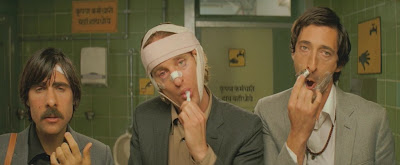 The Darjeeling Limited would seem to close the book on the first major period of Wes Anderson's career, bringing the themes of grief, nostalgia, obsession, trauma, and recovery first explored in Rushmore to a kind of resolution. In a movie whose wonderful first scene—in which one of Anderson's standby players, Bill Murray, misses the train and thus has to sit the movie out—demands that we view it in the context of Anderson's other films, the final shot of the brothers casting off the luggage of their dead father, which they have been carrying with them the entire movie, would suggest Anderson's casting off his own deeply loved thematic baggage as well.
The Darjeeling Limited would seem to close the book on the first major period of Wes Anderson's career, bringing the themes of grief, nostalgia, obsession, trauma, and recovery first explored in Rushmore to a kind of resolution. In a movie whose wonderful first scene—in which one of Anderson's standby players, Bill Murray, misses the train and thus has to sit the movie out—demands that we view it in the context of Anderson's other films, the final shot of the brothers casting off the luggage of their dead father, which they have been carrying with them the entire movie, would suggest Anderson's casting off his own deeply loved thematic baggage as well.
In Anderson's other movies, moving past one's grief has usually required consolation (one way or another) in the form of a psychic substitute. In Rushmore, Max's mourning for his mother is psychologically transferred into obsessive devotion, first to Rushmore itself and later to Miss Cross; at the end of the movie he seems able finally to break free of his grief and enter into a healthier sort of relationship with both Grover Cleveland High and Margaret Yang only as Miss Cross becomes (through her relationship with pseudo-father Herman Blume) not a potential lover but a kind of imaginary mother. In The Royal Tenenbaums, the lingering trauma so present in the lives of every member of the family (especially Chas's) is displaced and resolved by a semi-miraculous last-minute end-of-life reconciliation with a changed Royal. In The Life Aquatic, our usual position is interestingly reversed as the child (Ned) who recovers his lost parent (Stevesie) is subsequently taken from the parent, who himself achieves a kind of reapproachment with the universe through his relationship with surrogate children, Klaus's nephew Werner and Jane's infant son. (Think, too, of Ned's ghost in the crow's nest.) Not so in Darjeeling. The brothers can acquire no adequate substitute for their lost father, and the mother who has betrayed them, once hunted down, simply betrays them again, sneaking out and vanishing in the middle of the night. The redemptive jaguar shark of Aquatic is here replaced with a man-eating tiger, forever lurking in the shadows, haunting everything.
Not so in Darjeeling. The brothers can acquire no adequate substitute for their lost father, and the mother who has betrayed them, once hunted down, simply betrays them again, sneaking out and vanishing in the middle of the night. The redemptive jaguar shark of Aquatic is here replaced with a man-eating tiger, forever lurking in the shadows, haunting everything.
No one and no thing can return to the Whitman brothers what they have lost, or rather what they have always been denied in the first place—and so they have no other choice but to just leave it all behind them.
More overtly comedic than any of Anderson's other films, with more than a few surprisingly slapsticky exchanges, Darjeeling is in other ways the most overtly tragic, facing head-on nostalgia's unforgiving brutality: our scars don't heal, the dead don't rise, the things we have lost do not return to us. But this brutality is matched in the same breath with a fuller vision of what redemption must mean, one that promises us not a return or replacement of the thing we lack but the ability to live our lives without it.  Ben said a few weeks ago that this is either Anderson's worst movie or else his second-best, and I think that's more or less correct—I just don't think I can say which it is until I've seen it a few more times. In any event I found the movie to be fantastic, and am utterly perplexed by the lukewarm "I guess this is all right if you like Wes Anderson" reviews. In particular the reviewers who have bemoaned the movie's supposed lack of character, resolution, and higher-order meaning strike me as embarrassingly, transcendentally wrong. The film is the culminating stroke of Anderson's entire career thus far, the deepest and most full-throttle exploration of his trademark themes; what we get from him next will surely be a very different sort of film, a rupture with the past, which like any other rupture is exciting, inevitable, and something to be deeply mourned.
Ben said a few weeks ago that this is either Anderson's worst movie or else his second-best, and I think that's more or less correct—I just don't think I can say which it is until I've seen it a few more times. In any event I found the movie to be fantastic, and am utterly perplexed by the lukewarm "I guess this is all right if you like Wes Anderson" reviews. In particular the reviewers who have bemoaned the movie's supposed lack of character, resolution, and higher-order meaning strike me as embarrassingly, transcendentally wrong. The film is the culminating stroke of Anderson's entire career thus far, the deepest and most full-throttle exploration of his trademark themes; what we get from him next will surely be a very different sort of film, a rupture with the past, which like any other rupture is exciting, inevitable, and something to be deeply mourned.
Monday, October 15, 2007
preliminary thoughts about The Darjeeling Limited (with spoilers)
Posted by Gerry Canavan
Posted by
Gerry Canavan
at
6:55 PM
![]()
Labels: Darjeeling Limited, film, Wes Anderson
Subscribe to:
Post Comments (Atom)


|